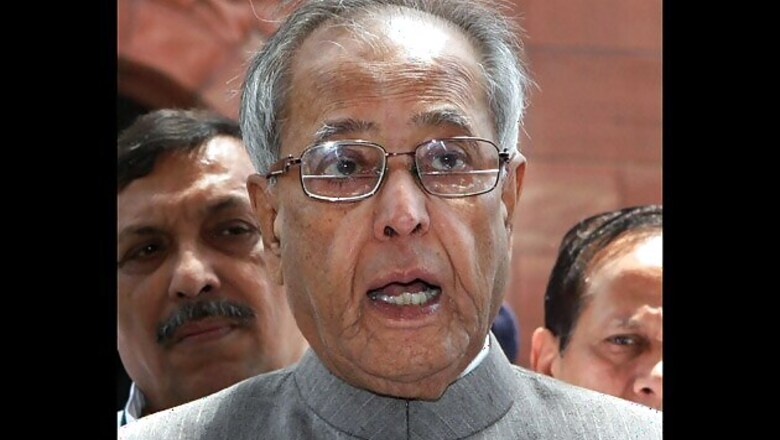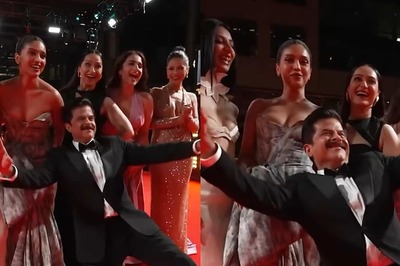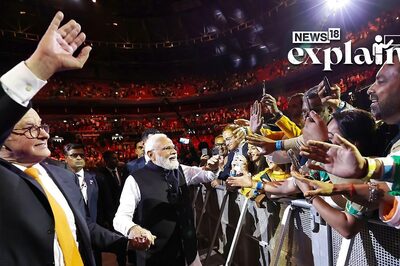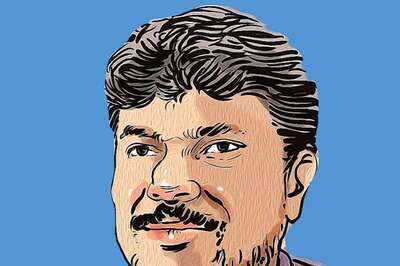
views
Karan Thapar: Hello and welcome to The Last Word. After the Finance Minister's widely reported speech on the economy we ask how serious is the situation? What are the steps needed to tackle it and will the government act? That's with the JD(U) MP NK Singh, BJP treasurer Piyush Goyal, Congress spokesman Manish Tewari and the Executive Vice-Chairman of Ashok Leyland, R Seshasayee.
Q: Let's start with the state of the economy. NK Singh, growth is down. Inflation is stubbornly high, the current account and fiscal deficits are ballooning, the rupee is at its lowest and foreign investors seemed to be turning away. In your eyes, how serious is the situation?
NK Singh: I think that the situation is going from bad to worse. The current economic consideration is not a matter of months. It represents a systemic neglect in which warning signs have all been ignored. The macro fundamentals of the economy remain very weak. Unacceptably high fiscal deficit, current account deficit which is worse than the deficit in 1991, foreign investors turning away from India, inward capital flows low, uncertainty in the manufacturing sector, a subdued services sector and what is worse is that the investment gearing ratio which is fundamental to high GDP growth because of a decline in savings rate from 37.6 per cent to what it was in 2007-08, to just 31 per cent, a decline of 6 percentage point in savings rate lowering the investment gearing ratio and a government in no mood to act on the key legislations on which there is fortunately bipartisan support. Even on those legislations there has been hesitation if not paralysis on the part of the government to act.
Q: Let me bring in Mr Seshasayee. I want to build in a sense on what you have just heard from Mr NK Singh. On the 15th of May the Financial Times had an article where they quoted a large western fund investor who said, "On every indicator we look at, there is a red flag," and then the gentleman said somewhat tongue-in-cheek, "This country meaning India is close to becoming the Greece of Asia." No doubt that comparison is absurd, but is there a grain of truth in the fear that underlies it?
R Seshasayee: I think it's very easy to slip from a mood of a very high optimism to suddenly get into this mood of despondency and I think that is certainly beginning to happen in this country. The party of course affected by the fact that the global mood is pretty despondent. You can't have very upbeat mood when sovereign risks are getting precipitated. But clearly I think the mood inside this country is getting contributed party by competitive politics, partly by the fact that yes some of our fundamentals are looking wobbly now and partly by the fact that the sentiment as a result of all this is getting to be so poor.
Q: Manish Tewari, the Finance Minister said in Parliament yesterday that India's growth story is intact. But if you look at the facts they suggest something very different. After all growth in the last quarter was down to 6.1 per cent and in fact in March industrial output actually shrank by 3.5 per cent. So if he says the growth story is intact, is he using the word intact to mean something different from what we all understand?
Manish Tewari: I am not going to interpret the Finance Minister's remarks, but I would tend to agree with what Mr NK Singh has said that indeed the situation as it stands is definitely a matter of concern and I do not want to say anymore because that would run the risk of sounding alarmist. So the question is that where do we go from here? I think the way forward is very clear. We need to get some key legislations passed. The Direct Taxes Code, the GST, the three big ticket reforms which industry looks at, pensions, insurance banking. Some of them are backward government. Some of them are still with the standing committee. But I think the more important thing is that we need to demonstrate multi-partisanship on the question of the economy. The government is prepared to walk the extra mile. Consult with whomsoever needs to be consulted with and let's try and put politics aside, because if the economy slips, I don't think any politics at the end of the day is going to be worth it. So, therefore I would like to appeal to wiser heads, on all sides of the political aisle that this is the time when global economy is sluggish, that we need to come together, we need to close ranks and we need to get some of these things done.
Q: Can I stop you? Your appeal is well taken. But let's wait a moment for Piyush Goyal, the Treasurer of BJP to join us. He is a bit delayed. He is actually stuck in Parliament trying to overtake a vote that's happening. Let's then pursue this business of consensus. Let me bring in Mr NK Singh. Yesterday, in Parliament the Finance Minister said, I am going to take a little bit of unpopular steps. Of course Mr Mukherjee didn't say what he had in mind, but you have been Revenue Secretary. You have assessed the situation very accurately for me. Beginning with the fiscal deficit which many believe is the single most serious domestic problem that he needs to check, what are the steps he needs to take?
NK Singh: In my view there are three important steps and I will say this very quickly, because I have to rush back to the house, the voting is about to begin shortly. First and foremost is I think make a deep fiscal correction by rationalising subsidy on petroleum oil products and fertilisers. Second, I think which is more important, revive sagging investor confidence. When Montek and I were in a road show many years ago, he said that investor confidence goes like a coconut tree, but it falls like a coconut when it does. So rebuilding investor confidence and reigniting the India growth story is going to something which must begin now. Finally, I entirely agree with Manish that we need bipartisan support for the key legislations which will restore the India growth story and bring really India back to the path of high global growth.
Q: Before I lose you, I want to put something to you. Your second point was to build up investor confidence. That of course is often the echo that you hear from an industrialist. But there is also at the same time this enormous sense of policy paralysis. How dependent is the building of investor confidence on this policy paralysis ending and the reform measures that are stuck going through?
NK Singh: I think that the government really must reach out for strong bipartisan support to break this picture of a policy paralysis. Elections are still far away. The government cannot be in a jinx for so long. India can't afford this. The India growth story can't afford this. The NDA has held its hand out to support the congress, or the UPA rather on some key legislations particularly on pension, on banking and insurance and I hope that they are able to overcome some of the handicaps that they have in managing their own allies in going forward with these important legislations which will be a critical step in reviving investor confidence.
Q: You interestingly said the NDA has reached out and offered to help but the problem is that on some issues where they have offered to help, the NDA has also put in amendments which perhaps undermine the intention of the war altogether. Take insurance, you want to cap it at 26 per cent which is what it is at present. You don't want the permission for FDI to go up to 49 per cent. That in a sense undermines the whole object of the reforms. So is the NDA really reaching out and helping or is the NDA really laying down conditions that undermine the object entirely?
We have lost Mr NK Singh at that critical point to Parliament I suppose. That's understandable on a night like this when there is a vote at the house. Mr Seshasayee, let me put that concern to you. We are talking about the importance of cross-party consensus to overcome the sense of policy paralysis and you heard Mr NK Singh say before he had to leave us that the NDA is reaching out. I pointed out that in some areas like insurance, the NDA may say it's reaching out, but it's also putting a cap on the percentage of FDI permissible. It won't let it go up from 26-49 per cent and the government says that undermines the reform altogether. So is the NDA really reaching out, or behind the claim that it's reaching out, is it also undermining?
R Seshasayee: I am sorry that the entire nation is being held at ransom. The growth of this economy is being put aside simply because there is so much of competitive politics that's going on. I think the people of this country are losing faith now in this political system, because what should be done and so what's so clear to everybody, to all the political leadership, to all the people doesn't get done simply because we want to score browning points and this is a very sad state of affairs. I think what is also very disturbing and very concerning is the fact that at time when the mood is slipping into a more of despondence even there is a spectre of slipping away from a virtuous cycle to a vicious cycle, we need leadership to say, don't worry we are there. We are going to be taking the following steps and we will do it in a manner where you are going to get this comfort that although there is going to be some pain now, we are going to come out of the same. We are going to have this gain coming at the end of this. We don't see that kind of a robust voice coming in from anybody and this is the most worrying part. The leadership today is not giving confidence to the people of this country that things are going to get better.
Q: When you say the leadership, are out talking about the fiasco we saw at the end of last year where over a period of 10 days flat the government announced FDI in retail and then withdrew it and even though in December the Prime Minister was promising people like Ratan Tata, Mukesh Ambani, Narayana Murthy, Deepak Parekh that it would happen by June this year. Clearly, it's not. So is that the sort of absence of leadership, the absence of conviction that you think is responsible as well?
R Seshasayee: I do certainly think that leader must be able to say yes we are going to face these obstacles. We are going to have the problem relating to our coalition partners. But we are going to manage that. We are going to deliver that. So this is what is expected of leadership. But equally let me also say that the opposition cannot absolve itself of the responsibility of making sure that the national interest is protected. You cannot say that today the leadership should only be assigned to the party in power. There is clearly leadership that is expected of the opposition parties and they must also act in the best interest of the country.
Q: Let me very quickly bring in Piyush Goyal who has joined us. Thank you for coming out of Parliament and finishing that vote very quickly so you could be with us. I want to put this to you. We are talking about the need for cross-party consensus because there is a real sense of economic crisis that affects the country. It affects all of that and the truth is that it affects the poor most of all. Is the NDA genuine about helping the government pass the reform measures like pension, like banking, like insurance, like GST that are held up or are you behind the claim that you will help actually seeking to impose your wishes for instance, in insurance where you are insisting on a 26 per cent cap and not permitting the government to increase it to 49 per cent. So behind the disguise of helping, are you trying to enforce your own will?
Pitysh Goyal: We have consistently maintained that we are willing to cooperate and give constructive cooperation to this government despite our differences on many issues and despite a lot of unilateralism that this government has indulged in, we have always been willing to extend a hand of cooperation. I had said it to you, I had said it to many people in the past, there was no dialogue because there was no reach out. After all, we could not go to the government and say, hey we want to help you, please let us talk to you. At the same time, finally it seems some good sense has prevailed. There is some dialogue that some of the senior leaders of the Congress and the UPA has started and the result of that you can see this session a lot of business has been transacted including very controversial bills of let's say Kapil Sibal which have been hanging fire for years altogether. Today we had cleared the Copyright Bill almost. Let me come to insurance since you raised that specific point. When we went into the insurance debate we were almost convinced that we should have 49 per cent, my leaders, me myself. But the story that came across when we were given information about the insurance sector, about what has happened in the last 10 years. What sort of FDI has come in in the 24 private companies? We were convinced that they had a bad case. The government was not able to make a case for 49 per cent. Let them convince me. I had a formula to make it…
Karan Thapar: Let me stop you there before you go to your formula. Let's take it one-by-one rather than a monologue, because we will lose the ordinance if you talk too much at one go. I just want to point out one thing and then I am going to take a break. Initially when the BJP was opening up the insurance sector, it was Congress that insisted on the 26 per cent cap. You didn't want to cap. Today you switched positions and it's interesting that you say the government doesn't have the case, because that's like saying you didn't have a case in 2002. Let's take a break and come back. There is a certain biting of the bullets that government needs to do. Is Manish Tewari and the Congress Party prepared to grit their teeth and bite and if they do will Piyush Goyal and the BJP support them, or will they seek to take advantage of the pain that biting the bullet causes? That's the key issue on which revival of the economy depends.
Q: We were discussing the sense of economic crisis that hovers over the country. Let's come to this question of taking unpopular steps. Manish Tewari, did the Finance Minister really mean it when he said that if need be, he will bite the bullet, because people asked biting the bullets means allowing diesel, LPG and petrol prices to rise. It means allowing urea prices to rise. It probably means fairly serious expenditure cuts on the budget. If he does it he will reign in the fiscal deficit. If he doesn't, not only will the deficit balloon, but he won't meet his promised target of 2 per cent cap on subsidies. So is this rhetoric or is he prepared to grit his teeth and go ahead?
Manish Tewari: I entirely agree with you that fuel, food and fertiliser subsidy are the big ones and the tough ones, but allow me to take you back to June 2008, when oil prices were rising exponentially and we were supported by the left at that point in time, I wish you know is very sensitive to price movements especially in the oil sector. The UPA government then decided to bite the bullet, raise prices of not only petrol but diesel and even kerosene and LPG to a certain extent not withstanding the fact that my friend Mr Piyush Goyal and his party and their spokesperson described the UPA government as an economic terrorist. So therefore the short point be that when it comes to national interest we are prepared not only to bite the bullet, but we are prepared to take all the hard measures which are essential in order to put the economy firmly back on track, not withstanding the flag which we may get. If we get support from them that's more than welcome, but even if we do not get support, if we get flagged we will go ahead and do whatever is required to be done.
Q: Alright, I interpret that once bitten we will bite again. Piyush Goyal, if they do take that tough step, will the BJP support them or will you seek to exploit to take advantage of the pain that's inevitably going to be caused? Where will you stand at that critical point?
Piyush Goyal: My dear friend Manish is certainly getting good homies, but they will have to get their allies onboard first before they talk to us. But more importantly my question to you if I mismanage my business and I cheat with my company, why should my customers pay me more?
Q: Mr Goyal, forgive me. I am asking the questions. Don't put a question to me and the question I asked you avoided, because I am asking the questions. Question I asked you definitely avoided which is why I am repeating it. If Manish and company bite the bullet as they say they will, will you support them or will you take advantage and embarrass them? It's a critical question. Answer it.
Piyush Goyal: I have no interest to take any advantage. First, let them set the house in order. Let them get a complete cohesive government agenda and put it before us. Let us hear what are their austerity measures? Let us hear how they are going to correct the rupee-dollar parity which they have ruined because of mismanagement of economy because I am not going to make the consumer pay for their misgovernance.
Q: Are you saying that the condition for supporting them is that they must first have Mamata and the DMK onboard, because then there actually sounds to me like a back route out of not helping them. You know Mamata won't support them. So when you, regardless Mamata supports them…
Piyush Goyal: I am not obliged to run their coalition government. They did not give me support when I lost in 1999 by one vote. I didn't go to the Congress to give me one vote to run the government. They have to first set their house in order. I am willing to support them if they don't mismanage the economy.
Q: That sounds like an interesting condition. I want to go first to Mr Seshasayee. You have heard Manish Tewari say Congress is prepared to bite the bullet. You have heard Piyush Goyal say BJP will support them but only if they get their house in order. Getting their house in order is half the problem this government has. Therefore it looks to me as if you may not get BJP support for the tough measures. Let me ask you think as an industrialist. If the bullet isn't bitten, if the fiscal deficit isn't reined in, if efforts aren't made to push through the reforms that will change the entrepreneurial mood in the country then in that situation what is the condition and the picture that we will face this time next year?
R Seshasayee: Firstly, forgive me for saying this, but this is exactly what I meant by this competitive politics going too far. We have heard this kind of a debate go on and I would really appeal to the political leadership, do you really think that the nation can be kept at ransom playing these kind of competitive political gamesmanship? Pardon me for saying this, but this is a situation where we are nearly getting into a crisis and it requires concerted action and is this really the time for this kind of a debate? Jointly the question. If it don't bite the bullet, if it don't take the corrective measures and if it don't get other deficits in control, yes for sure next year they would have already blown up the India story. I have no doubt in my mind about it, because I think we are in a very fragile situation where we could be slipping into this vicious cycle that I referred. I think we must realise this.
Karan Thapar: I am going to leave you with The Last Word, because I think it's a sobering thought for all of us to observe. If we don't take decisive steps, we will blow up the India story and also there is a message there to politicians, give up this competitive politics. Put the country first. Put your party next. Put yourselves last of all. I hope politicians are listening. My thanks to all three of my guests for joining me. My thanks also to NK Singh for taking time out of Parliament to join us. Thanks for watching.




















Comments
0 comment